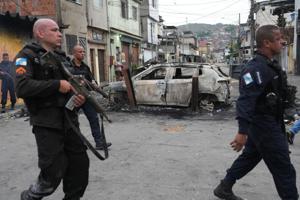World
Brazilian Security Forces Conduct Deadly Raid in Rio’s Favelas

A significant police operation in Rio de Janeiro has resulted in over 100 fatalities following a daylong raid targeting drug gangs in the city’s favelas. This operation, which took place on July 25, 2023, has been described by officials as one of the most extensive and violent police actions in recent years, igniting fierce gun battles between law enforcement and criminal groups.
The aggressive sweep led by Brazilian security forces was aimed at dismantling the entrenched drug trafficking networks that have plagued the region for decades. Eyewitness accounts and local reports indicate that the violence escalated rapidly, with gunfire echoing throughout the densely populated neighborhoods. Many residents found themselves caught in the crossfire, resulting in numerous injuries alongside the confirmed deaths.
In the aftermath of the raid, images emerged showing bodies lining the streets, a stark reminder of the violence that continues to engulf parts of Rio. The Associated Press has curated a gallery of these poignant images, showcasing the human toll of the operation. The graphic nature of these photos highlights the severe consequences for civilians living in areas dominated by drug trafficking.
Government Response and Community Impact
Officials have defended the operation as a necessary step to restore order and safety in the favelas, which have long been under the influence of powerful drug gangs. Brazilian authorities, while acknowledging the high number of casualties, maintain that such measures are vital to combat organized crime. Local politicians and community leaders, however, express concern over the heavy-handed tactics employed by police, fearing that such violence only exacerbates existing tensions between law enforcement and residents.
The raid has sparked protests in various neighborhoods, with community advocates calling for better policing strategies that prioritize dialogue and community engagement rather than violent confrontations. Many residents argue that the government must address the root causes of crime, such as poverty and lack of opportunity, rather than relying solely on military-style operations.
International reactions to the incident have been mixed, with human rights organizations urging the Brazilian government to reevaluate its approach to law enforcement in marginalized communities. Critics argue that excessive force only perpetuates a cycle of violence and trauma, further alienating those who live in the favelas.
Looking Ahead: The Path Forward
As Brazil grapples with the ongoing challenges of drug-related violence, the events of July 25 serve as a critical juncture in evaluating the effectiveness of current security policies. The government faces mounting pressure to reform its strategies and foster a more sustainable approach to law enforcement that respects human rights and prioritizes community safety.
The situation in Rio de Janeiro underscores the complexities of managing urban violence in a society where socio-economic disparities remain stark. With over 100 lives lost in a single day, the need for a comprehensive solution has never been more urgent. Moving forward, the focus must shift towards building trust between law enforcement and communities, ensuring that security measures do not come at the expense of human dignity and safety.
-

 Science2 weeks ago
Science2 weeks agoResearchers Challenge 200-Year-Old Physics Principle with Atomic Engines
-

 Politics2 weeks ago
Politics2 weeks agoNHP Foundation Secures Land for 158 Affordable Apartments in Denver
-

 World5 days ago
World5 days agoBoeing’s Aircraft Production: Assessing Numbers and Challenges
-

 Entertainment4 days ago
Entertainment4 days agoSyracuse Stage Delivers Lively Adaptation of ‘The 39 Steps’
-

 Health2 weeks ago
Health2 weeks agoNeuroscientist Advocates for Flag Football Until Age 14
-

 Lifestyle2 weeks ago
Lifestyle2 weeks agoLongtime Friends Face Heartbreak After Loss and Isolation
-

 Lifestyle3 days ago
Lifestyle3 days agoTrump’s Push to Censor National Parks Faces Growing Backlash
-

 Lifestyle5 days ago
Lifestyle5 days agoRed Bluff High School’s Elli Nolan Named Rotary Student of the Month
-

 Science4 days ago
Science4 days agoAI Misidentifies Doritos Bag as Gun, Triggers Police Response
-

 World2 weeks ago
World2 weeks agoGlobal Military Spending: Air Forces Ranked by Budget and Capability
-

 Business2 weeks ago
Business2 weeks agoSpirit Airlines Cuts Workforce with Furloughs for 365 Pilots
-

 Top Stories5 days ago
Top Stories5 days agoUrgent Search for Suspect Who Exposed Himself to Teen Girl









